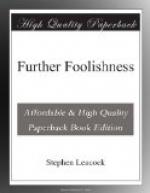“No,” said a friend of mine the other day, “I never go to Grand Opera,” and then he added with an air of pride, “You see, I have absolutely no ear for music.”
“You don’t say so!” I exclaimed.
“None!” he went on. “I can’t tell one tune from another. I don’t know Home, Sweet Home from God Save the King. I can’t tell whether a man is tuning a violin or playing a sonata.”
He seemed to get prouder and prouder over each item of his own deficiency. He ended by saying that he had a dog at his house that had a far better ear for music than he had. As soon as his wife or any visitor started to play the piano the dog always began to howl—plaintively, he said—as if it were hurt. He himself never did this.
When he had finished I made what I thought a harmless comment.
“I suppose,” I said, “that you find your sense of humour deficient in the same way: the two generally go together.”
My friend was livid with rage in a moment.
“Sense of humour!” he said. “My sense of humour! Me without a sense of humour! Why, I suppose I’ve a keener sense of humour than any man, or any two men, in this city!”
From that he turned to bitter personal attack. He said that my sense of humour seemed to have withered altogether.
He left me, still quivering with indignation.
Personally, however, I do not mind making the admission, however damaging it may be, that there are certain forms of so-called humour, or, at least, fun, which I am quite unable to appreciate. Chief among these is that ancient thing called the Practical Joke.
“You never knew McGann, did you?” a friend of mine asked me the other day.
When I said I had never known McGann, he shook his head with a sigh, and said:
“Ah, you should have known McGann. He had the greatest sense of humour of any man I ever knew—always full of jokes. I remember one night at the boarding-house where we were, he stretched a string across the passage-way and then rang the dinner bell. One of the boarders broke his leg. We nearly died laughing.”
“Dear me!” I said. “What a humorist! Did he often do things like that?”
“Oh, yes, he was at them all the time. He used to put tar in the tomato soup, and beeswax and tin-tacks on the chairs. He was full of ideas. They seemed to come to him without any trouble.”
McGann, I understand, is dead. I am not sorry for it. Indeed, I think that for most of us the time has gone by when we can see the fun of putting tacks on chairs, or thistles in beds, or live snakes in people’s boots.




